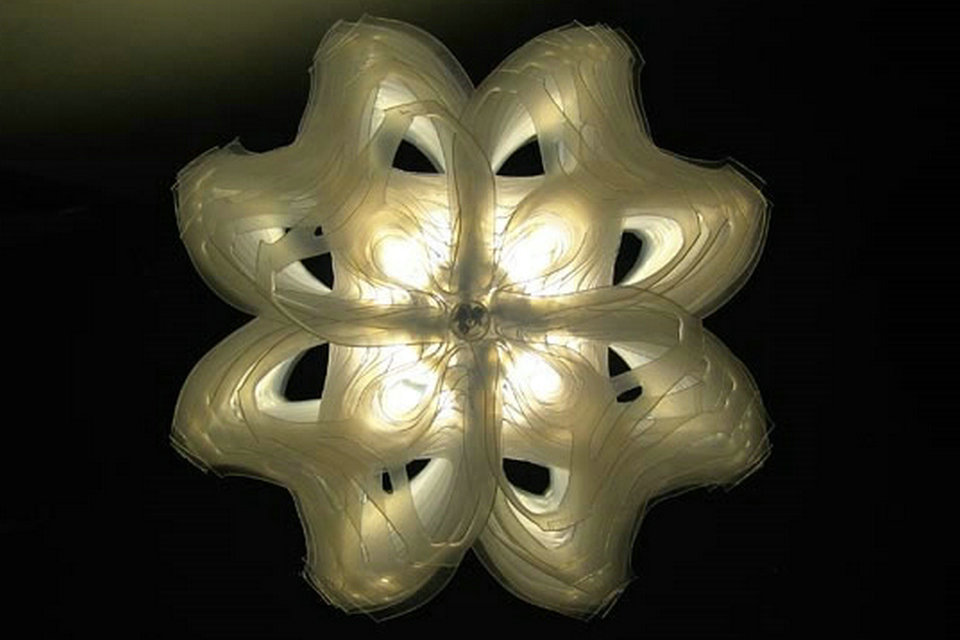Origomu (Japanese: オリゴム) is a movement originated in New York City by Chilean artist Tatiana Pagés in 2009. It is the practice of recycling plastic waste into wearable art. Artwear that inspires both creative thought and a greater sense of stewardship toward our planet. Origomu comes from the Japanese ori, meaning “folding”, and gomu, meaning “rubber”.
Every year, thousands pieces of plastic and debris threaten the lives of shore birds and marine animals, harming our environment. Origomu can make a difference – no matter how far you are from the nearest shore. The Origomu movement advise people to cherish the environment, transform waste into beautiful artwear.
Origomu go beyond environmental awareness. We need to inspire people to create solutions, such as a biodegradable plastic, or one that could rapidly break down without harming the natural environment. For example of the 6-pack carrier, whose company put an end to the environmental dangerous by creating a safer packager with photodegradable plastic.
Origomu keep on working to prevent litter from getting to our shores and finding other uses for what would be debris.
The Origomu project reflects an awareness of the environmental effects of pollution and waste and employs the arts to inspire people to recycle and reuse environmentally harmful waste in creative ways.
The Challenge
From the Equator to the Polar Regions, from Indonesia to Mexico, the world’s oceans are contaminated by plastic debris harming millions of sea birds and marine animals. At least 267 different species are known to have suffered from entanglement or ingestion of marine debris including seabirds, turtles, seals, sea lions, whales and fish.
Over 46,000 pieces of plastic litter are floating on average for every square mile of ocean today, killing countless sea birds and marine animals every year.
Measures
Hi-Cone, the leading manufacturer of six pack rings, has joined us in helping raise awareness.
They have taken positive action to respond to concern about animal entanglement. All recyclable six-pack rings have been made of photodegradable LDPE plastic since 1989. This means that is if ring carriers are carelessly discarded, they will photodegrade or break apart when exposed to UV rays.
Shortly after Hi-Cone carriers are exposed to the sun’s UV rays, they begin to lose “structural integrity,” and “elongation” decreases as they degrade. The carrier loses approximately 75% of its structural integrity in a matter of days. Continued exposure will cause maximum embrittlement in a matter of weeks. At this point, it will break apart when disturbed by wind, rain or other forces occurring naturally in the environment, posing minimal danger to wildlife.
International legislations to prevent shipping from dumping plastic at sea
Costly beach and seabed clean-up operations
Public awareness campaigns
In the near future, we will be adding recycling partners to incorporate materials from the top three sources of animal entrapment in our designs: Fishing Line, Fishing Nets and Plastic Bags.
These measures have not been successful in eradicating the problem of debris and its effect on wildlife.
Technique
Origomu help people discover that the simple act of recycling is more than a responsibility, it’s an opportunity. A real chance to encourage your inventiveness. This manual contains four basics lessons to start designing with six-pack-rings. It is currently being used in workshops, community organizations and particulars through this website. Future editions will include lessons to design with other plastic materials.
Feel free to mix, change or create a new method. Whatever stimulates your ideas. It doesn’t matter If you end creating belts, chairs, curtains or even a dress, all discoveries are welcome. Upload your designs so you can inspire others to recycle through art.
Overview
The technique has been taught in workshops at Pratt Institute in New York City, making necklaces using six-pack rings as chief material. Origomu is based in connecting art and fashion with environmental awareness. The technique has also been taught in workshops for low-income women.
Origomu necklaces has since been displayed at the Eco-Fashion exhibit at The Museum of FIT, the Cirque Du Soleil Ecological Tent in Montreal, Canada, the country of Ecuador and the Punta Cana Foundation in Dominican Republic.
Origomu organized an international design contest. Creations from 25 countries were submitted and design and fashion experts chose the most innovative pieces. There was a first round of 8 finalists, out of these, three winners.
By April 2011, the movement had collected over 200,000 plastic six-pack rings, resulting in more than 500 Origomu designs. Over 305 designers have created Origomu pieces from countries such as Mexico, India, Portugal, New Zealand, United States, Ecuador, Chile, Belgium and Switzerland, among others.
